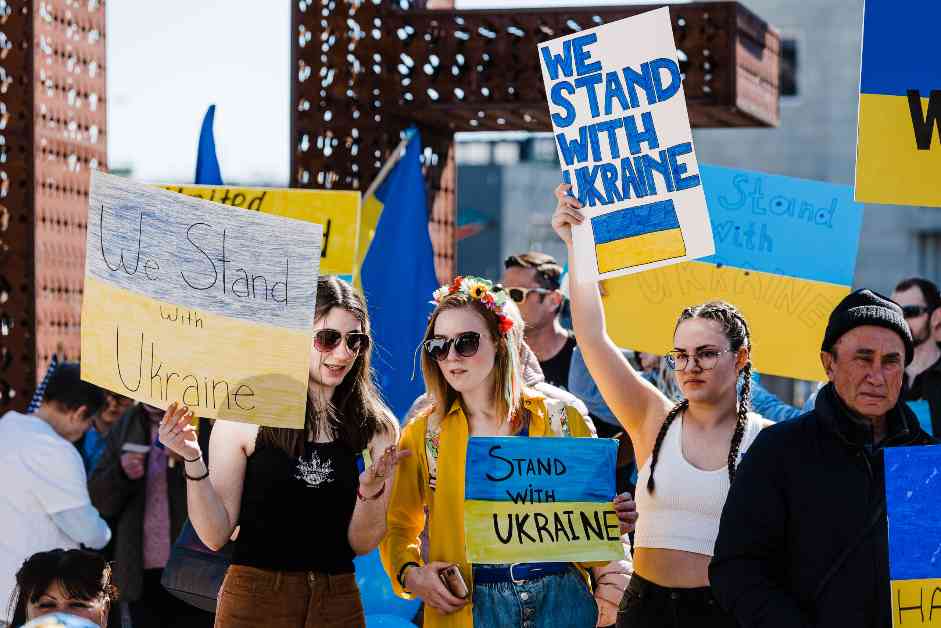Nevadans Show Strong Support for NATO and Aid to Ukraine
A recent poll conducted in Nevada has revealed that a majority of the state’s voters support continuing military assistance to Ukraine. The issue, which has become a key political debate within the Republican Party, is expected to be a significant international concern for the next president.
According to the poll results, 64 percent of Nevadans believe in continuing support for Ukraine after considering arguments for and against American assistance in the country’s conflict with Russia. The level of support for Ukraine varied significantly between Democrats and Republicans, with 78 percent of Nevada Democrats in favor of continuing military aid compared to only 50 percent of Republicans.
The poll, conducted by the Program for Public Consultation at the University of Maryland’s School of Public Policy, surveyed 604 adults in Nevada through online opt-in surveys from July 19 to August 2, with a margin of error of 4.5 percent. The results indicated that Nevadans’ support for aid to Ukraine aligns closely with the national average of 67 percent.
Partisan Divide on Support for Ukraine and Collective Security Principles
The poll also examined Nevadans’ attitudes towards collective security principles promoted by the United Nations, the U.S.’ continued involvement in NATO, and participation in the global moratorium on nuclear testing. The majority of respondents expressed support for continued U.S. engagement in each of these instances of multinational cooperation.
However, a notable partisan divide was observed in the poll results, with Democrats showing greater support for collective security, NATO, and the nuclear testing moratorium compared to Republicans. This divergence was most pronounced on the issue of Ukraine, reflecting the broader national split on the matter within Congress.
President Joe Biden has been a vocal advocate for maintaining military aid to Ukraine as a means of upholding the NATO agreement and deterring Russian aggression. While Ukraine is not a NATO member, neighboring countries like Poland are, which would trigger U.S. defense obligations in the event of an attack on Ukraine.
The Debate Over U.S. Involvement in Ukraine
The debate over U.S. involvement in Ukraine has been a contentious issue, with various perspectives emerging within the political landscape. While some argue that arming Ukraine serves as a deterrent to further Russian aggression and potential threats to NATO countries, others question the effectiveness and implications of continued military assistance.
Respondents in the poll reflected these diverse viewpoints, with some highlighting the importance of supporting Ukraine to prevent further conflict and instability in the region. Others expressed concerns about the costs and potential risks associated with prolonged involvement in Ukraine’s conflict with Russia.
Political Ramifications and Congressional Actions
The partisan divide on the issue of Ukraine has manifested in congressional debates and decisions, with Democrats and Republicans taking differing stances on the provision of military aid to the country. The poll results underscore the complexity of the issue and the challenges of finding consensus on foreign policy matters that have far-reaching implications.
In Nevada, Democratic representatives and senators have generally supported continued assistance to Ukraine, while some Republican officials have raised concerns about the effectiveness and accountability of such aid. The differing perspectives within the state’s political landscape mirror the broader national debate on U.S. involvement in Ukraine and the implications for international relations.
Public Opinion and Policy Preferences
The poll results offer valuable insights into public opinion and policy preferences among Nevadans regarding foreign affairs and national security issues. The majority of respondents expressed support for maintaining U.S. engagement in NATO, upholding collective security principles, and providing military assistance to Ukraine.
While there are differences of opinion across party lines, the poll findings indicate a general consensus on the importance of international cooperation and strategic alliances in promoting global stability and security. The results highlight the nuanced perspectives and considerations that shape public attitudes towards complex geopolitical challenges.
In conclusion, the poll results demonstrate the complexity and diversity of viewpoints within Nevada regarding U.S. involvement in Ukraine and broader issues of collective security and international cooperation. As these debates continue to unfold on the national stage, understanding public sentiment and preferences is crucial for shaping informed and effective foreign policy decisions.

